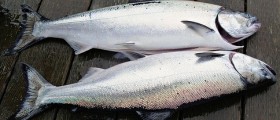
Types of Seafood
Any kind of sea life that is used as food by people, such as fish, shellfish, sea cucumber, lobster, or shrimp has many health benefits. Other than meat, many types of seaweeds are also prepared as meals and yield betterment. Seafood is rich in protein and is cultivated and enjoyed all around the world although vegetarians usually stay away from it. There are over 30, 000 types of fish, but only a handful are utilized for food. The most widespread ones include cod, eel, salmon, sardine, trout, and tuna. The foul odor produced by fish is caused by the dissolution of the amino acids into ammonia but does not diminish the potency of other elements contained in the fish. Fish is consumed worldwide, and is one of primary sources of animal protein as well one of the leading food irritants. The populations of Portugal, Iceland, and Japan are the biggest consumers of seafood products. As oil rich fish is a great source of protein it is recommended in the UK to be consumed once a week, coupled with another type of seafood. In addition, most of the fish products that are consumed in North America are imported from various parts of the world rather than caught prior to consumption. On the other hand, when dining out in a restaurant in many cases seafood will be served following the killing and cooking. Further, many countries are opting for importing live seafood rather than already dead, with the seafood import and export being a multimillion dollar per year industry. One of the reasons why many are choosing to import live seafood is because if the cooling standards are not proper most of the contents starts to bread down and become poisonous to eat. It should be noted that when costumers are purchasing fish products they should always check the expiry date as consuming bad fish leaves adverse consequences. The period in which fish can be consumed from the time it is killed is very short, and if it has gone bad it absolutely has to be disposed of. Fresh fish is always found near accessible water and often sold in the area. Cool transportation has brought fresh fish more towards the dry country. In order to preserve and transport many types of fish, it first has to be dried and salted. In the case of sardines and tuna, those are boiled and placed in cans. Furthermore, many experts caution against fishing in enormous quantities as it is estimated that in less than 40 years many seafood species will be endangered. Through careful manners of conducting the process, the downfall of many breeds can be avoided.
Health Benefits
The Omega – 3 acids found in fish are highly beneficial for optimal brain functioning. As many white fish are low in calories they should be included in the weekly diet in order to ensure strong bones and teeth, and lower the risk of cardiovascular problems. There are many research studies that suggest eating one fish meal a week in the monthly diet can lower the risk of heart failure by almost 50 percent. Fish contains very little amount of fat as well as low levels of cholesterol, and in turn is highly beneficial for the heart. Zinc is particularly beneficial for muscles and it reduces the occurrence of dermatological problems. Other health benefits concern the nervous system and the brain. The Omega-3 fatty acids have been proven to increase brain functionality in older people, restoring or preserving memory. They also help individuals suffering from ADHD overcome focus problems. Various types of fish are also rich in Vitamins A and D, and minerals such as selenium and iodine. Selenium has many cancer reducing benefits, while iodine helps regulate metabolism. Fish is known to alleviate the symptoms of bone and joint diseases, and at the same time protect from further damage. Finally, including fish in the daily diet of pregnant women or those who are breastfeeding is recommended by most medical care professionals as it has numerous health, and developmental advantages for the newborn.
Mercury Content
Many types of fish and other seafood contain high dosage of mercury. Sharks, tuna, or any fish that feeds on other fish is known to have very toxic levels of mercury. In addition, most fish preserve their levels or mercury rather than discharging them, so the overall amount of the toxic substance only grows with time. Also, the amount of mercury is fish which feed on other fish can be up to 10 times higher than in those who only consume seaweeds. As the Japanese are one of the leading consumers of fish in the world, they unfortunately had to deal with the largest mercury induced poisoning ever recorded. In addition, during pregnancy or breastfeeding it is best to consult with an expert as to which fish to avoid and which to consume to absorb the benefits but stay away from adverse effects of mercury.

















Your thoughts on this
Loading...